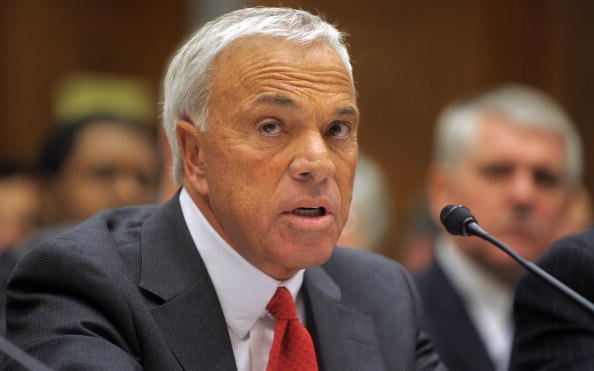Angelo Mozilo at a Glance
Angelo Mozilo: The Rise and Fall of a Mortgage Titan
Introduction: The Angelo Mozilo Story
Angelo Mozilo, a name synonymous with the rise and fall of Countrywide Financial, was a prominent figure in the American mortgage industry. His career, marked by both immense success and profound controversy, offers a compelling case study of ambition, innovation, and the devastating consequences of the 2008 financial crisis. This article delves into Mozilo’s life, from his humble beginnings to his role at the helm of one of the nation’s largest mortgage lenders, and the eventual legal battles that defined his later years.
Early Life and Career Beginnings
Angelo Mozilo was born on November 29, 1938, in the Bronx, New York, to a family of Italian immigrants. His upbringing instilled in him a strong work ethic and a deep understanding of the struggles of the working class. These early experiences would later influence his ambition to expand homeownership opportunities.
After graduating from Fordham University in 1960 with a degree in economics, Mozilo entered the mortgage industry, laying the foundation for his future endeavors.
Countrywide Financial: Building a Mortgage Empire
In 1969, Mozilo, along with his business partner David Loeb, co-founded Countrywide Credit Industries, later known as Countrywide Financial Corporation. Starting as a small operation, the company quickly grew into a national powerhouse, becoming a leading player in the mortgage market. Mozilo, as CEO, focused on streamlining the mortgage process and expanding access to home loans, making the dream of homeownership a reality for millions of Americans.
Key aspects of Countrywide’s success included:
- Innovation: Countrywide was an early adopter of computerized loan processing, significantly speeding up the approval process.
- Market Expansion: The company expanded its reach across the United States, becoming one of the largest mortgage lenders.
- Secondary Market Participation: Countrywide played a critical role in the secondary mortgage market, selling loans to government-sponsored entities (GSEs) like Fannie Mae and Freddie Mac, which helped fuel its growth.
The Subprime Mortgage Crisis: A Turning Point
Countrywide’s fortunes took a dramatic turn with the onset of the subprime mortgage crisis in 2007. The company had aggressively pursued subprime lending, offering mortgages to borrowers with poor credit histories. When the housing market began to falter, many of these high-risk borrowers defaulted on their loans, contributing to the collapse of the housing market and triggering the 2008 financial crisis.
Mozilo’s leadership during this period became highly controversial. He faced accusations of:
- Misleading Investors: Critics alleged that Mozilo downplayed the risks associated with Countrywide’s loan portfolio, concealing the potential for widespread defaults.
- Insider Trading: There were claims that Mozilo profited from the sale of company stock while knowing the company’s financial health was deteriorating.
Legal and Financial Fallout
The fallout from the subprime mortgage crisis was severe for Countrywide and Mozilo. Bank of America acquired Countrywide in July 2008 for $4.1 billion, a deal that would later cost BofA billions in losses related to Countrywide’s toxic assets. Shortly after the acquisition, Mozilo stepped down as CEO.
In 2009, the Securities and Exchange Commission (SEC) charged Mozilo with securities fraud and insider trading. He eventually reached a settlement with the SEC in 2010, agreeing to a lifetime ban from serving as an officer or director of a public company, but without admitting or denying the allegations. Countrywide was required to pay a portion of the penalty due to an indemnification agreement in Mozilo’s employment contract.

Getty
Legacy and Controversy: Mozilo’s Enduring Impact
Angelo Mozilo’s legacy is complex and contested. His early achievements in expanding access to homeownership and streamlining the mortgage process had a significant positive impact on the American economy and society. However, his actions during the subprime mortgage crisis and the ensuing legal proceedings have undeniably tarnished his reputation.
Some of the key points of his legacy include:
- Pioneer of Mortgage Lending: Mozilo helped transform the mortgage industry.
- Champion of Homeownership: He expanded opportunities for homeownership.
- Architect of the Subprime Crisis: His leadership and decisions contributed to one of the worst financial crises in history.
- Symbol of Corporate Greed: He became a figure of controversy and blame during the crisis.
Mozilo died in July 2023, leaving behind a net worth of $600 million, a stark reminder of the financial rewards and legal consequences that defined his career. His story serves as a cautionary tale of the risks of unchecked ambition and the importance of ethical conduct in the financial world. His career is a case study taught in business schools on the ethics of the industry.
Conclusion
Angelo Mozilo’s life story is a study in contrasts. He was a visionary leader who revolutionized the mortgage industry but ultimately became a symbol of the excesses that led to the 2008 financial crisis. His story serves as a reminder of the profound impact individuals can have on the financial system, for better or for worse. The legacy of Angelo Mozilo will continue to be debated and analyzed, reflecting the enduring complexity of his career and the era he helped shape.

